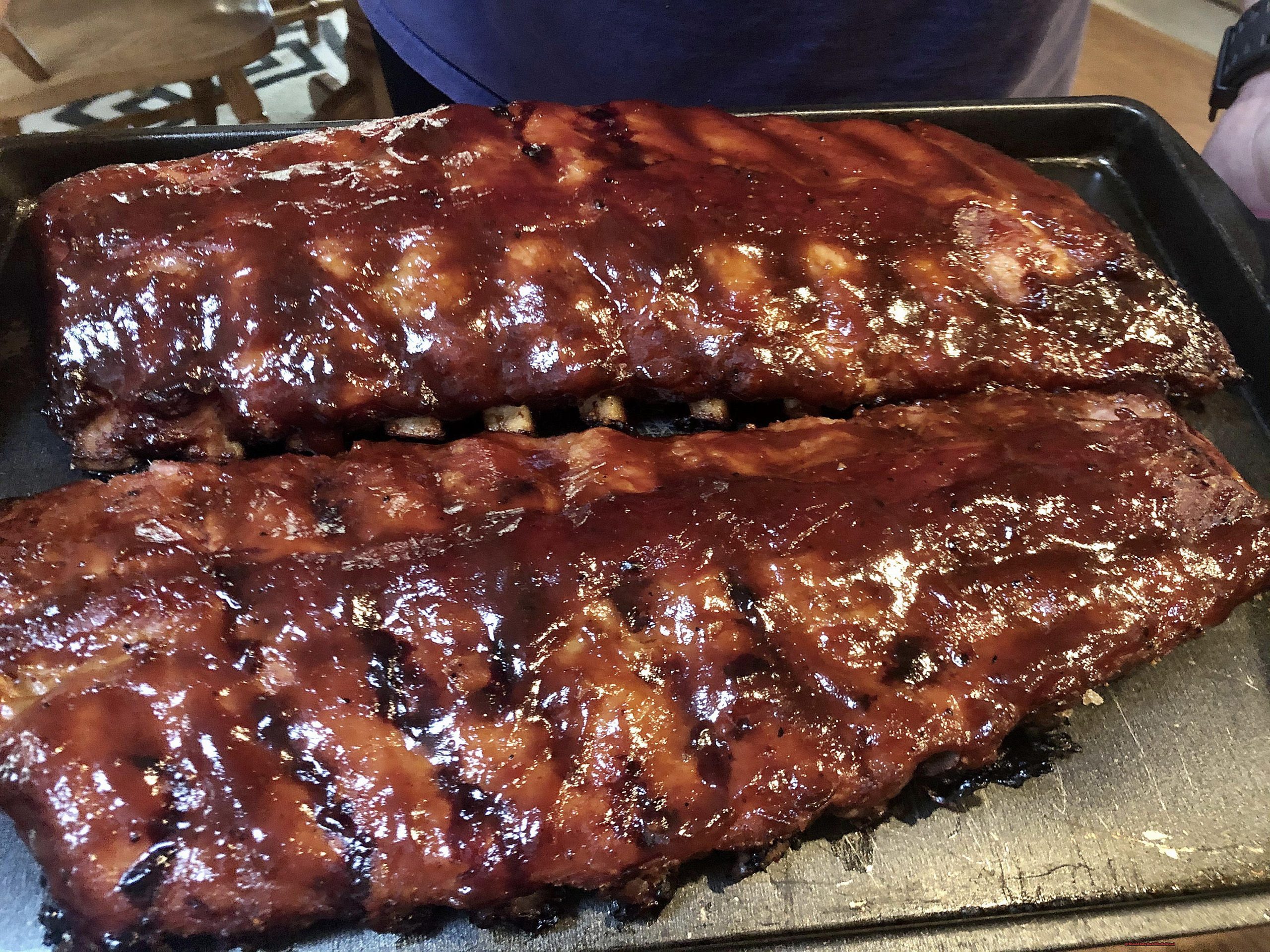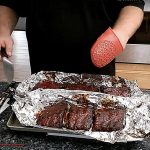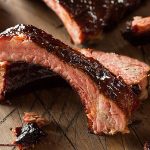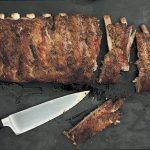Are you a die-hard fan of baby back ribs? Do you crave the succulent, tender meat that practically falls off the bone? Then you’ve probably heard the ongoing discussion about whether or not these delectable ribs should be brined before cooking. Some swear by it, claiming it adds an extra layer of flavor and moisture to the meat. Others argue that it’s unnecessary and can actually ruin the texture of the ribs. So, let’s sink our teeth into this juicy debate and answer the burning question: should baby back ribs be brined?
For those who are unfamiliar, brining is a process where meat is soaked in a saltwater solution to enhance its flavor and tenderness. Proponents of brining argue that it helps keep the ribs moist and prevents them from drying out during cooking. They believe that this step is essential for achieving perfectly cooked, juicy baby back ribs.
On the other hand, opponents of brining argue that it can make the ribs too salty and affect their texture. They claim that brining can result in rubbery or mushy ribs, which is definitely not what we want when we’re craving some mouth-watering BBQ.
But here’s where things get interesting – there are different methods and recipes for brining baby back ribs. Some call for a simple saltwater solution, while others incorporate herbs, spices, and even sugar into the mix. Each method may have its own unique impact on the final result.
So, what’s the verdict? Should you take the time to brine your baby back ribs or just throw them on the grill as-is? Ultimately, it comes down to personal preference and experimentation. Some people swear by brining while others find it unnecessary. The only way to truly know which camp you belong in is to try both methods yourself.
So, grab some racks of baby back ribs and get ready for a delicious experiment. Whether you choose to brine or not, one thing is for sure – these ribs will be the star of your next BBQ.
Contents
What is a brine, and why should you use one for your ribs?
A brine is a solution of saltwater that is used to enhance the flavor and tenderness of meat. This traditional cooking technique has been utilized for centuries and is a fantastic approach to infuse flavor and moisture into your baby back ribs.
The process of brining involves soaking the meat in the saltwater solution for several hours or even overnight. This allows the solution to penetrate the meat, resulting in a juicier and more flavorful end product. The salt in the brine breaks down the proteins in the meat, making it more tender and helping it retain moisture during cooking.
To elevate the flavor profile of your ribs, you can also add other ingredients such as apple cider vinegar, brown sugar, and spices to the brine. The acidity of the vinegar balances out the flavors and adds a tangy kick to the ribs.
For optimum results, it is recommended to brine for at least 24 hours. This gives enough time for the flavors to fully infuse into the meat and for the salt to do its magic. However, if you are short on time, even a few hours of brining can make a noticeable difference in the tenderness and taste of your ribs.
Brining isn’t just limited to baby back ribs; it can also be used for other meats like pork chops or tenderloins. By using the same brine recipe, you can add succulence and flavor to a variety of dishes.
In conclusion, brining is an essential step in achieving perfectly tender and flavorful baby back ribs. The combination of saltwater, vinegar, sugar, and spices work together to enhance the texture and taste of the meat. So next time you fire up your grill, don’t forget to give your ribs a good soak in a delicious brine beforehand.
How to make our baby back rib brine recipe
If you want to try our special recipe for baby back rib brine, gather the ingredients listed below and follow the instructions provided.
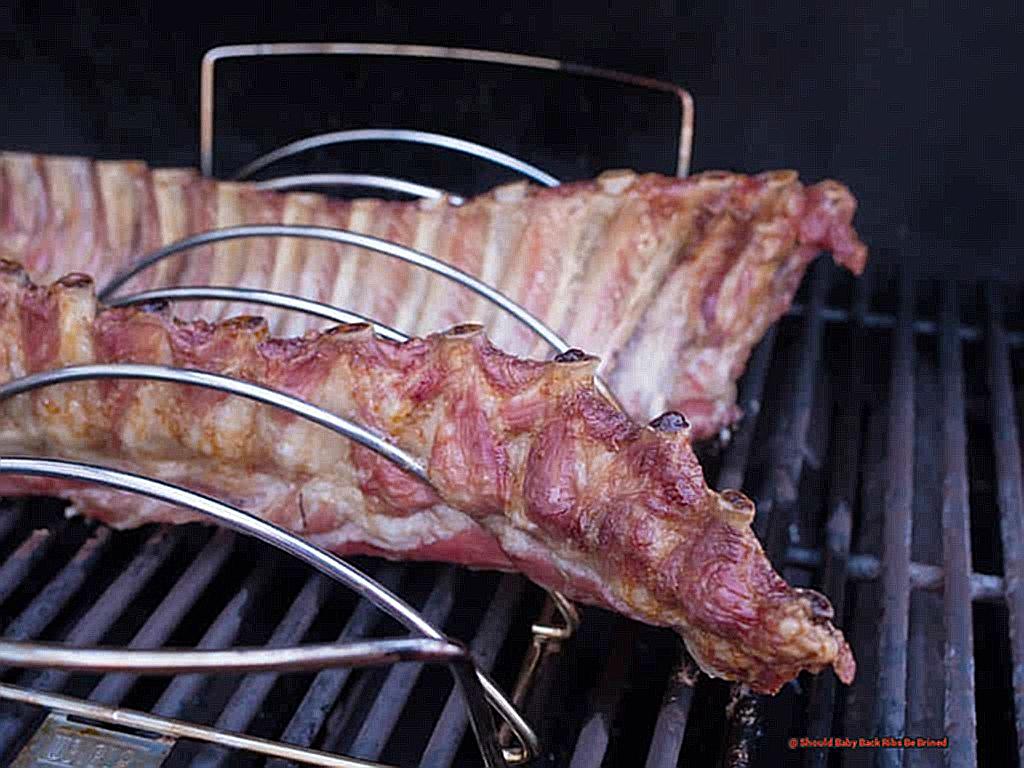
| Ingredients: | Instructions: |
| 1 gallon of water | Take a large pot and combine 1 gallon of water, 2 cups of apple cider or juice, 1/2 cup of brown sugar, and 1/2 cup of kosher salt. Heat the mixture until the sugar and salt are fully dissolved. |
| 2 cups of apple cider or juice | Add in 4 cinnamon sticks, 1 tablespoon of peppercorns, 4 cloves, and 2 bay leaves to the brine mixture. |
| 1/2 cup of brown sugar | Allow the brine to cool completely before submerging your baby back ribs in it. Ensure that the ribs are fully immersed. |
| 1/2 cup of kosher salt | Cover the pot and place it in the refrigerator for at least 24 hours. |
| 4 cinnamon sticks | After 24 hours, take out the ribs from the brine and pat them dry with paper towels. |
| 1 tablespoon of peppercorns | In a small bowl, mix together 1/4 cup of brown sugar, 2 tablespoons of paprika, 1 tablespoon of salt, 1 tablespoon of garlic powder, 1 tablespoon of onion powder, 1 teaspoon of cinnamon, 1 teaspoon of chili powder, 1 teaspoon of black pepper, and 1 teaspoon of dry mustard to make the rub. |
| 4 cloves | Generously apply the rub on both sides of the ribs. |
| 2 bay leaves | Prepare your cooker or grill by setting it to indirect heat at a temperature of 285-300°F. |
| 1/4 cup of brown sugar | Hang the ribs inside a barrel-style cooker or place them on indirect heat on a grill. Cook for about 3 hours, spritzing with the brine every 45-60 minutes using a spray bottle. |
| 2 tablespoons of paprika | 10. Check the internal temperature of the ribs. Once it reaches 193-203°F, remove them from the cooker and let them rest for a few minutes. |
The benefits of using a brine for your ribs
There are a multitude of benefits to utilizing a brine for succulent baby back ribs. Brining not only imparts delectable flavor and tenderness to the meat, but also aids in retaining its juiciness while cooking. Our unique brine concoction is simple to prepare and can also be utilized for other types of meat, making it a versatile addition to your BBQ arsenal.
Brining is a tried and true method that has been used for centuries to enhance the flavor and texture of meat. It involves submerging the meat in a saltwater solution for a period of time before cooking. This process allows the salt and other flavors from the brine to penetrate the meat, resulting in more flavorful and tender ribs.
But why is brining specifically beneficial for baby back ribs? This cut of meat is known for being lean, which can make it prone to drying out during cooking. However, by brining the ribs beforehand, you are essentially creating a barrier that prevents moisture from escaping, resulting in perfectly moist and succulent ribs.
Our special brine recipe not only includes salt, but also other flavorful ingredients such as herbs, spices, and sugar. These additional elements not only add depth of flavor, but also help to break down the proteins in the meat, resulting in more tender and juicy ribs.
But don’t limit yourself to just using our brine recipe for baby back ribs. It can also be used for other types of meat, such as chicken or pork chops. Experiment with different flavor combinations and make it your own.
In conclusion, using a brine for your ribs is not only a practical way to add flavor and tenderness, but also a versatile technique that can be applied to various types of meat.
How to cook your ribs using the brine recipe
To properly prepare your baby back ribs for cooking, follow these steps:
-
- Select a suitable container for the brine, such as a large pot or food-grade plastic bag.
- Create the brine solution by mixing together water, salt, and any desired spices or seasonings.
- Fully submerge the ribs in the brine, ensuring they are completely covered by the liquid.
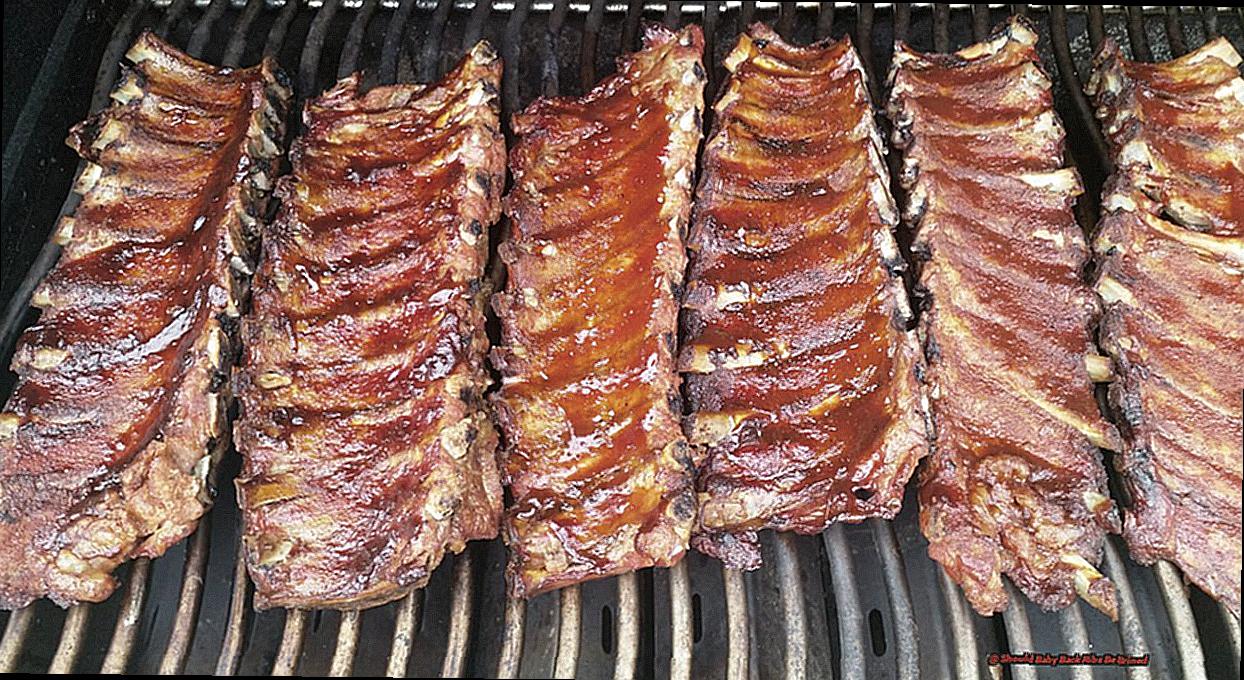
- Allow the ribs to marinate in the brine for 1 hour per pound of meat (or adjust based on personal preference).
- Keep the ribs refrigerated while they are being brined.
- Once the desired brining time has passed, remove the ribs from the brine and discard the solution.
- Thoroughly rinse the ribs with cold water and pat them dry using paper towels.
- Proceed with your preferred cooking method.
| Ingredients | Measurement |
|---|---|
| Baby back ribs | – |
| Water | 1 gallon |
| Salt | 1 cup |
| Spices/seasonings (optional) | – |
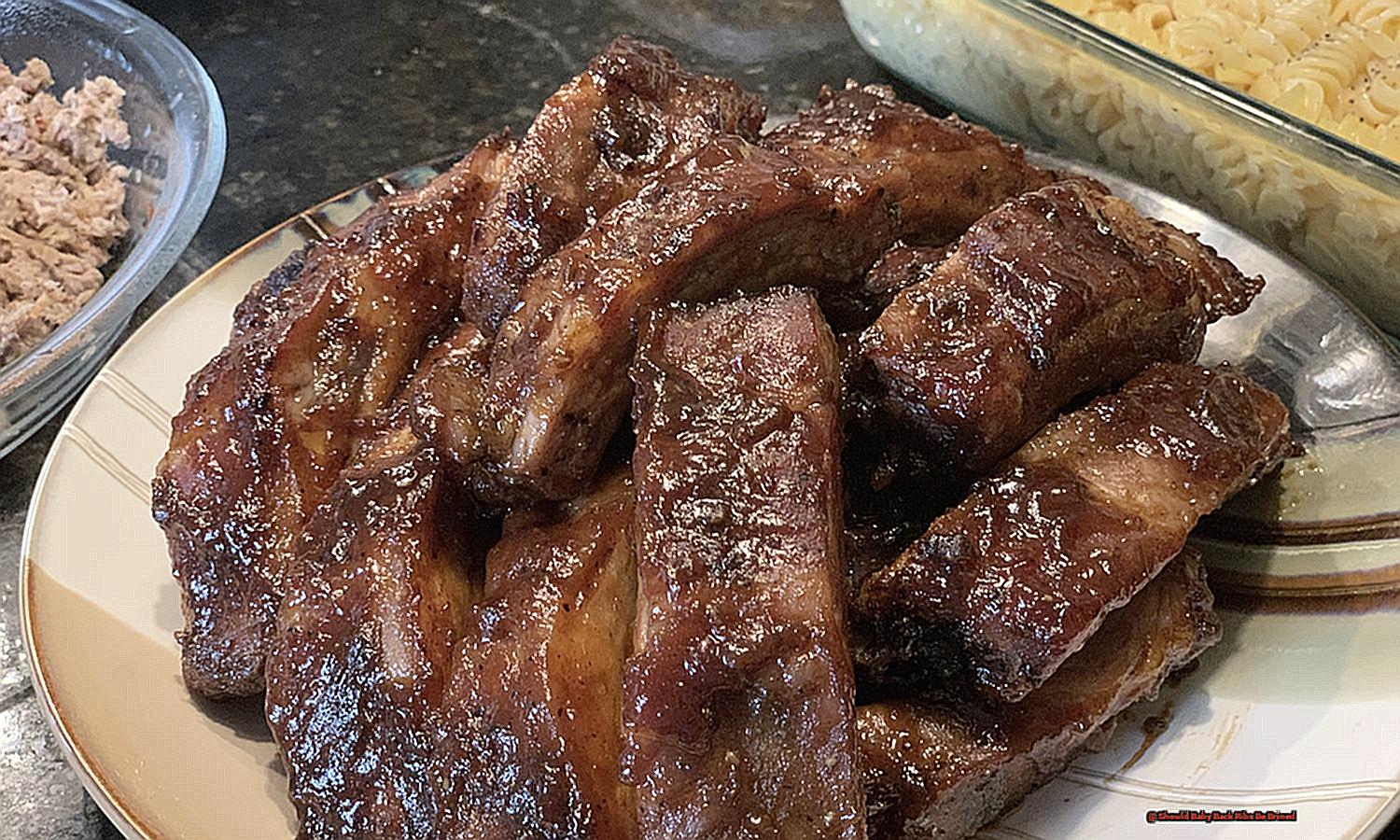
It’s important to keep in mind that the ribs should be completely thawed before being brined and that the length of time for brining can vary depending on personal preference. Brining is a crucial step in enhancing the moisture and flavor of the ribs, resulting in a more succulent and tender end product. Be sure to follow food safety guidelines and refrigerate the ribs during brining to prevent any bacterial growth.
Recipes featuring BBQ baby back rib brine
Preparing BBQ baby back ribs requires an essential step: brining. This process not only adds moisture and tenderizes the meat, but also imparts delicious flavors. Here are some mouth-watering recipes that demonstrate the advantages of using a brine for BBQ baby back ribs.
Root Beer BBQ Ribs:
Ingredients:
- 2 racks of succulent baby back ribs
- 4 cups of root beer
- 1/2 cup of salt
- 1/4 cup of brown sugar
- 1 tbsp of garlic powder
- 1 tbsp of onion powder
- 1 tsp of black pepper
- 1 bottle of your preferred BBQ sauce
Instructions:
In a large pot or container, mix together the root beer, salt, brown sugar, garlic powder, onion powder, and black pepper to create a flavorful brine.
Submerge the ribs in the brine and refrigerate for at least 4 hours or overnight.
Preheat your grill to a temperature between 275°F to 300°F and remove the ribs from the brine. Rinse and pat dry.
Grill the ribs for approximately 3 hours, basting with BBQ sauce during the last 30 minutes.
Allow the ribs to rest for a few minutes before serving.
Honey Garlic Ribs:
Ingredients:
- 2 racks of succulent baby back ribs
- 4 cups of water
- 1/2 cup of honey
- 1/4 cup of soy sauce
- 1/4 cup of brown sugar
- 3 cloves of garlic, minced
- Salt and pepper to taste
Instructions:
In a large pot or container, mix together water, honey, soy sauce, brown sugar, garlic, salt, and pepper to create a delectable brine.
Submerge the ribs in the brine and refrigerate for at least 4 hours or overnight.
Preheat your grill to a temperature between 275°F to 300°F and remove the ribs from the brine. Rinse and pat dry.
Grill the ribs for approximately 3 hours, basting with BBQ sauce during the last 30 minutes.
Let the ribs rest for a few minutes before serving.
Bourbon Peach BBQ Ribs:
Ingredients:
- 2 racks of succulent baby back ribs
- 4 cups of water
- 1/4 cup of bourbon
- 1/4 cup of peach preserves
- 1/4 cup of brown sugar
- Salt and pepper to taste
Instructions:
In a large pot or container, mix together water, bourbon, peach preserves, brown sugar, salt, and pepper to create an irresistible brine.
Submerge the ribs in the brine and refrigerate for at least 4 hours or overnight.
Conclusion
In conclusion, the debate surrounding whether baby back ribs should be brined before cooking is a tantalizing one. While some argue that brining enhances the flavor and moisture of the meat, others believe it can alter the texture. However, with a variety of methods and recipes for brining available, the only way to truly determine which side you stand on is to try both techniques yourself.
But what exactly is a brine and why should you use one for your ribs? A brine is a saltwater solution that elevates the taste and tenderness of meat. It works by breaking down proteins in the meat and infusing it with delectable flavors. Our unique brine recipe not only includes salt but also incorporates other flavorful ingredients such as apple cider vinegar, brown sugar, and spices.
Using a brine for baby back ribs has numerous advantages. It helps retain moisture during cooking, resulting in succulent and tender ribs. Moreover, our versatile recipe can also be used for other types of meats like chicken or pork chops.
To properly prepare your ribs using our recipe, follow these simple steps: create the brine solution, fully submerge the ribs in it for at least 1 hour per pound of meat, rinse and pat dry before cooking.
And if you’re craving some mouth-watering dishes featuring BBQ baby back rib brine, look no further than our Root Beer BBQ Ribs, Honey Garlic Ribs, or Bourbon Peach BBQ Ribs. With these recipes, you’ll experience firsthand how using a brine can elevate your baby back ribs to unparalleled levels of succulence and flavor.

